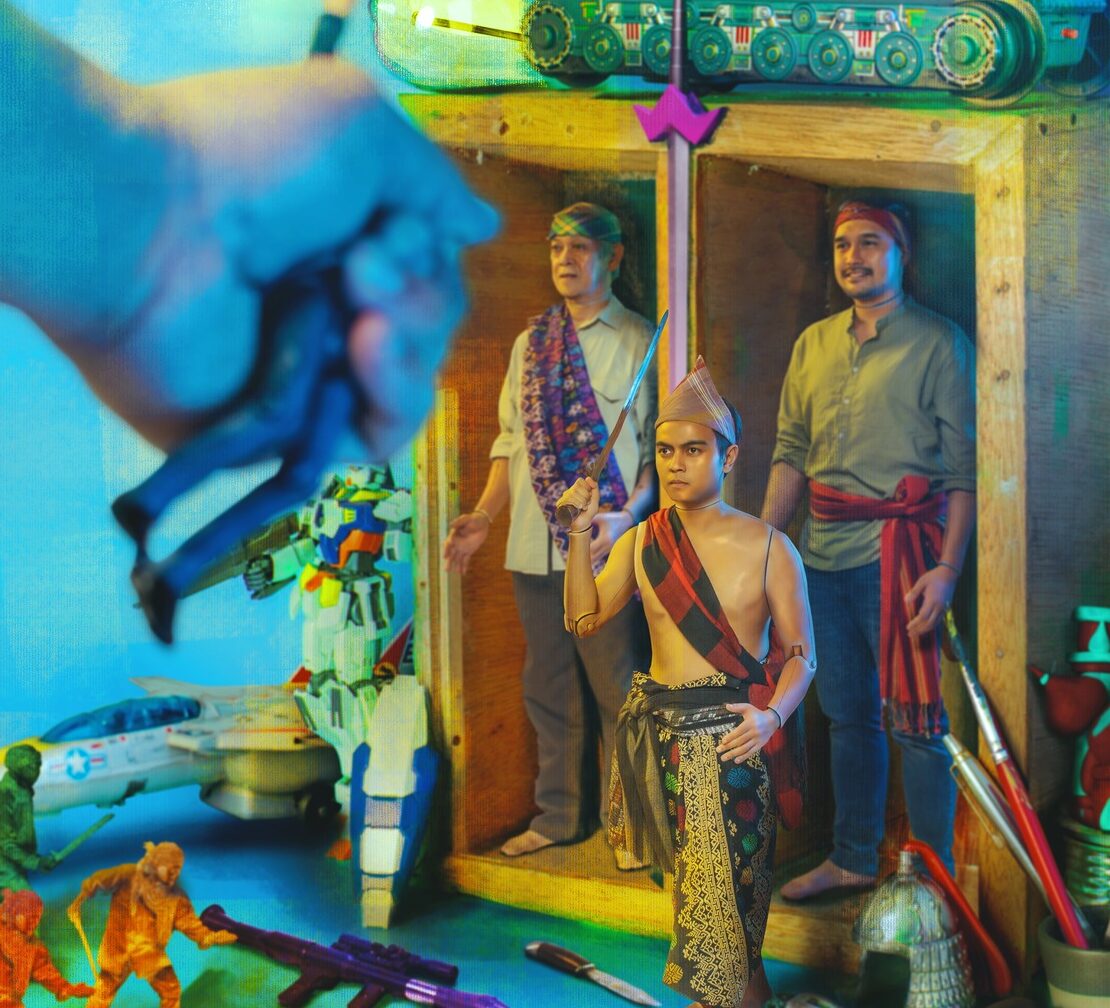Sometimes it may be fair to say that we at the capital live radically different lives, perhaps to the point of detachment from our fellow citizens on the other end of the country. So when there is a chance to not only witness the truth they hold, and to share it for more people to know, you take it. Even if it means throwing shade at those in power and their bloody history.
That’s what appears to have happened in Tanghalang Pilipino’s latest play “Anak Datu.” Inspired by the short story of the same title written by National Artist for Visual Arts Abdulmari Imao, the play revolves around three narratives with a common thread tying them together: The effects of war and violence on people, and our never-ending search for peace.
Given this theme, it’s obvious to say that “Anak Datu” is far from the light and hope-filled productions we see (or have probably associated popular theater with) on social media as of late. But that’s only fair. After all, theater isn’t just about the moments that make us burst into song; it isn’t just about the ups and downs of love, or the ways we can still sometimes radically hope. Theater talks too of struggles and pain, of injustice, and of history. And to truly give justice to the stories contained within this particular two-hour show, we cannot gloss over or sanitize details.
Three timelines and narratives intersect throughout the piece: A somber confessional from Jibin Arula, the sole survivor of the Jabidah Massacre in 1968; the personal lives and reflections of Abdulmari Imao, his wife Grace, and their son Toym amid martial law in the ’70s; and the mythical “Anak Datu,” a fictional short story penned by the elder Imao, about the son of a village chieftain in pre-colonial Sulu, which navigates themes of bravery, strength, and the cost of peace.
Jibin Arula, played by Nanding Josef, delivers a chilling recollection of a history not many of us know. It is brave in naming the forces that have brought upon many of still-existing problems in Muslim Mindanao, foremost the armed conflicts. Making use of beautifully choreographed movements (by Hassanain Magarang and executed with precision by the Tanghalang Pilipino Actors’ Company), and backed by archival footage flashed all over the black box theater, the audience is faced with the dark facts. These snippets of history may come across as preachy to others, if only because the production has made no business of sanitizing the truth. But these segments of history aren’t just injected to educate—they also serve as memorials, especially for the thousands of innocents whose blood had been spilled over the decades.
In contrast to Jibin Arula’s dark narrative is the colorful myth of “Anak Datu,” the short story. It is the only segment of the play that is sung through, led by Tex Ordoñez-De Leon as the narrator of Putli Loling, wife of village chieftain Datu Karim.
Through the narrator’s chants, backed by the bright beats and notes of traditional gongs, the play then shifts in tone. This time it follows Putli Loling, whose village is torn by sea pirates led by Jikiran. Held captive, the pregnant Putli Loling gives birth to a son, whom she names after his real father, the now missing Datu Karim. Jikiran raises the child as his own and soon changes his ways, giving up the life of looting and conquering other tribes for a more peaceful one. But when old enemies come to seek revenge on Jikiran, the truth is soon revealed, and the young Karim must choose whether to fall into the cycle of revenge, or to choose a new path towards peace.
True to the myth’s origins as a creation of the National Artist Imao, the production used his artworks, splashed across the black box walls, to serve as the myth’s backdrop.
The story progresses alongside vignettes from the Imao family’s private lives, as they navigate a volatile period, almost paralleling the myth. The elder Imao, hailing from a Muslim family at one point, is being forced to join the armed resistance by his brother but instead chooses a more peaceful path through art.
It also shows how both parents—Muslim Abdulmari, artistic and peace-seeking; and Christian Grace, outspoken and strong-willed—influenced much of their son Toym’s character. They don’t hide the truth of their current societal situation (read: martial law) from Toym, and both influences are seen as Toym at the end of the play practices his own craft.
“Anak Datu” constantly shifts between these three narratives, at first seemingly randomly, but as the stories progress, each connecting thread becomes more apparent. The play ends with a song to ultimately tie together the three stories of war and the search for peace. It is a reminder of the many sides and faces of this ongoing fight, and a call to never forget the history we came from.
With the resurgence of live theater, staging “Anak Datu” is a brave and risky decision. At a time when popular culture and media are being bombarded with historical denialist propaganda, it is apt—a way to fight fire with fire, so to speak. But as they say (if I may be allowed to use this loosely), “art must disturb.”
“Anak Datu” does this deftly, however, and not just for the sake of crude disturbance. It is a weighty and crucial undertaking, and the production has done so with care. And if there are any stories that urgently need to be seen it is this: The stories of our country’s continuous struggle towards peace.
Tanghalang Pilipino’s “Anak Datu” runs until Oct. 9 at the Tanghalang Ignacio Gimenez (New Cultural Center of the Philippines Black Box Theater). Tickets are available through the CCP Box Office and Ticketworld.
“Anak Datu” is written by Rody Vera, with direction by Chris Millado and musical direction by Josefino Chino Toledo. Choreography by Hassanain Magarang, set design by Toym Imao, and costume design by Carlo Villafuerte Pagunaling. The play stars Carlos Dala as binatang Karim/Toym Imao, Nanding Josef as matandang Jibin Arula, Tex Ordoñez-De Leon as tagapagsalaysay ni Putli Loling, Hassanain Magarang as Datu Karim, Marco Viaña as Abdulmari Imao, Lhorvie Nuevo as Putli Loling, Antoinette Go as Grace de Leon, Mark Lorenz as batang Jibin Arula/ensemble, Arjhay Babon as Nur Misuari/ensemble, Earle Figuracion as Jikiran/ensemble, Vince Macapobre, Edrick Alcontado, Sarah Monay, Heart Puyong, Aggy Mago, Judie Dimayuga, Mitzi Comia as ensemble.




